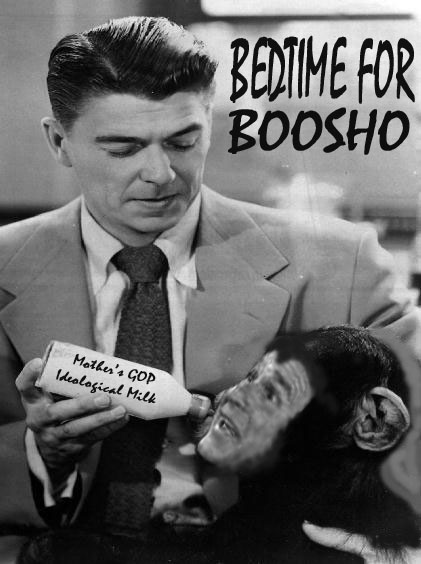
Universal International Pictures, 1951
Graphic by ©2004, UrbisMedia
A friend sent me – as a joke – a calendar of the Reagan Library. There’s a different photo of Ronnie for each month, smiling his cheerful, but somewhat vacuous, smile. One caught my eye, that of him in an Army uniform and looking like it was taken in the 1940s. Apparently, it was taken from one of the films Reagan made during those years, since there is no record of military service in his biography, although the calendar does not clarify that.
In the funereal pomp of this past week that ambiguity is further played out: military pall bearers, flyovers with the missing plane, the casket carried on a caisson, the 21 gun salutes and flag-draped coffin, all conveying a vague notion that Ronnie had served on battlefields other than those on the back lot at Warner Bros.
Where the actor and the politician left off has always been the mystery of the Reagan persona. He could act the brave president (“Mr. Gorbachev, tear this wall down.”) and read carefully constructed lies (unlike his successor’s) to national audiences, saying he still believed he was right about something he was wrong about while admitting it was wrong (selling arms to enemies to finance guerillas who terrorized innocent people). For this he had convenient (maybe not so) lapses in memory and, although his approval numbers went far lower than his successor’s, he “walked”; his successor was impeached for adultery. For all his nobility he had the most indicted administration in history (although that might change).
This is the way “the great communicator” managed things: keep the images broad and vague, with “evil empires” and “mornings in America,” his Hollywood versions of the world. He played this well to his Southern strategy and his massaging of the emerging American Taliban. But behind it was the B-list actor married to the C-list actress, both looking for a better role; the erstwhile union man, who found his true center in sympathies with the Red-baiting HUAC, and as the corporate pitchman, the champion of the rich and the white.
And now is the time for myths, told and re-told about how Reagan ended the cold war, when the Soviet Union had been crumbling for years under its own weight and internal corruption, and Gorbachev, with hisperestroika and glasnost , was ready to roll over; never-minding that Carter’s arming of the Afghans and the Saudis driving down USSR oil prices ruined their economy. The eulogizing makes little if any mention of the countless dead in Central America thanks to the Gipper’s commie phobia. And Margaret Thatcher, her coif as resistant to gale winds as Ronnie’s, forgot, in her sappy encomiums to mention the great Invasion of Grenada.
In the last scene The Gipper didn’t die with a memorable movie line, but after a long a debilitating illness the possible cure for which his ideological successor opposes research for. It was almost like a B Movie – just not quite enough.
___________________________________
©2004, James A. Clapp (UrbisMedia Ltd. Pub. 6.12.2004)
